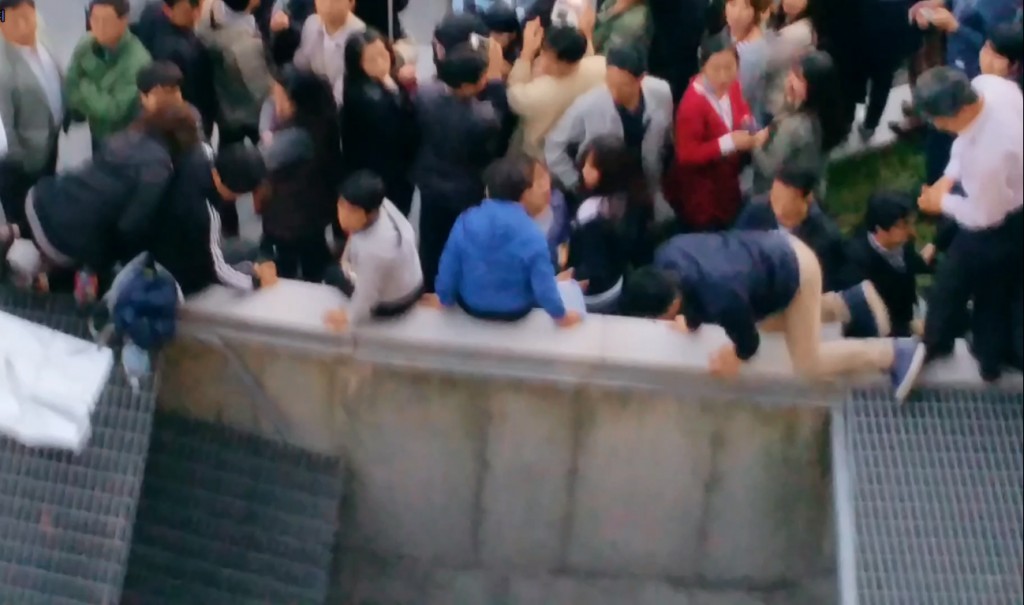- California Assembly OKs highest minimum wage in nation
- S. Korea unveils first graphic cigarette warnings
- US joins with South Korea, Japan in bid to deter North Korea
- LPGA golfer Chun In-gee finally back in action
- S. Korea won’t be top seed in final World Cup qualification round
- US men’s soccer misses 2nd straight Olympics
- US back on track in qualifying with 4-0 win over Guatemala
- High-intensity workout injuries spawn cottage industry
- CDC expands range of Zika mosquitoes into parts of Northeast
- Who knew? ‘The Walking Dead’ is helping families connect
Has Korea become ‘Republic of Accidents’?
People react with anger, grief and bafflement to concert mishap
By Lee Kyung-min
“Are we living in the Republic of Disasters (참사 공화국)?”
This internet headline captures the fear, anger and frustration felt by a nation that was shocked by a fatal accident during an outdoor concert, when it is still recuperating from the Sewol ferry tragedy.
A ventilation grating collapsed and 27 people standing on it fell 20 meters into an underground parking lot in the middle of a pop concert in Pangyo, south of Seoul, Friday evening.
Sixteen people were killed and eleven others were seriously injured.
“All we have heard since the Sewol ferry sinking is about how to improve safety,” said Lee, a 27-year-old man, who refused to reveal his full name.
“Nothing changes. The same headlines, the same government reaction and what not. The newspapers blame lax safety measures as the cause of yet another disaster and the saddest of all is that it all could have been prevented,” Lee said.
“What’s next?” Lee asked himself, and answered: “Some high-ranking government official bows in front of the cameras. Someone resigns, and it seems to quiet down. And another accident happens. It’s so cyclical that mentioning the problem seems boring.”
A 30-year-old office worker who identified herself as Kim suggested that a few security guards on site could have prevented the accident.
“The victims were trying to get a better view of the performers on stage. And I guess those people probably didn’t think too much about whether the grate was strong enough to support them or not. They were just being enthusiastic concert-goers, right?” she said.
“Maybe if someone had warned them, they wouldn’t have risked their lives,” she said.
A 55-year-old woman surnamed Yang, agreed that it was hard to understand why seemingly easy prevention measures are repeatedly ignored, or not implemented by the government.
“We’ve all heard enough how the prevention is better than the cure. Then why do things like this keep happening? It’s because the government is not doing its job, or someone in charge of safety is not doing their job. What could have the victims known? Those poor things,” she said.
The citizens’ outrage is further supported by eyewitnesses, who said that there was not one security guard at the site.
A man surnamed Park said in a Hankyoreh interview Friday that there were people wearing “STAFF” tags, but no one was stopping people from standing on the grate.
“All we heard was an announcement saying that each individual should take care of themselves,” he was quoted as saying.
Another eyewitness was quoted as saying, “Usually, people just stand there, or sit there when they are drunk. Up until now, nobody was warned. Few would have realized that it was not strong, and had the potential to collapse.”
According to an expert, the situation was clearly not under control.
Lee Kyung-gu, the chairman of the Architectural Institute of Korea, was quoted in the paper as saying: “A ventilation grating is not designed to support a heavy weight. The people who should have been in charge obviously failed to do their jobs.”
Meanwhile, deaths caused by lax safety measures have long made the nation angry at government rigidity in reflecting over what is needed to be changed quickly.
However, not everyone agrees that only the safety officials are to blame.
ID user we24**** posted a short message on a website criticizing the crowd who stood on the ventilation grate in the first place.
“It is a dangerous place to stand on. Didn’t they know that? Why did they have to go stand there? That was a bad idea.”
Others also found fault with the people who stood there.
“Let’s say there were security guards. Would the crowd have done what they were told to do? I seriously doubt it,” posted ID user blue****.
A Seoul National University professor Yi Sun-hyung said that everybody knows the prevention is always best, but the necessity of it is always felt a little too late.
“Regulations and the law are usually the last thing to reflect society’s need. When something big happens and people die, that damage makes people act. It’s awful, but it’s true,” she said.













![일본 사도광산 [서경덕 교수 제공. 재판매 및 DB 금지]](http://www.koreatimesus.com/wp-content/uploads/2024/07/PYH2024072610800050400_P4-copy-120x134.jpg)


